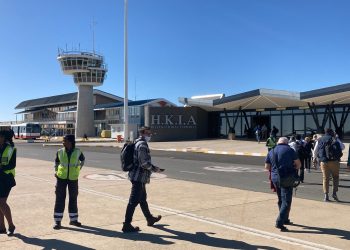
The Namibia Competition Commission (NaCC) has objected to the acquisition of Gasit by Vivo Energy Namibia Limited, citing concerns of heightened vertical foreclosure, rising costs for competitors, and potential barriers to market entry.
Vivo Energy Namibia’s merger would enable it to expand its presence in the LPG market, encompassing both downstream retail sales and upstream bulk supply through Vitas Gas, a subsidiary of Gasit.
“Our analysis reveals increasing foreclosure issues within the business sector, as well as cost-related concerns. We have identified potential activities that could lead to an escalation in costs, demonstrating our second finding. The third issue relates to the barrier to entry,” Johannes Ashipala, Director of Mergers and Acquisitions at NaCC, on Wednesday said while expressing the commission’s findings.
The NaCC emphasised the importance of addressing barriers to entry to maintain fair market competition.
“If the barrier to entry is low, even if the merging party engages in anticompetitive practices, other entities can enter the market and challenge such behaviour,†Ashipala explained.
He said the NaCC’s analysis prompts questions about the legality of hindrances to market entry and the ability of other entities to effectively challenge any potential anticompetitive behaviour.Â
“We must assess whether legal provisions exist to facilitate entry and whether other entities have the means to enter the market in the event of anti-competitive practices,” Ashipala added.
The competition watchdog said while employment has been noted during the investigation, it is not the primary focus of concern in this particular transaction.
The NaCC says these concerns underline the importance of maintaining a competitive landscape that promotes fair practices, protects consumers, and fosters market innovation.Â
Ashipala noted the analysis raises crucial questions about the merging parties’ ability to engage in certain activities and whether they hold a dominant position in the market.
“Currently, the supply of LPG is dominated by Vita Gas, with a 95% market share. The findings suggest that if the acquirer and the target company merge, their dominant positions would be consolidated, potentially leading to concerns regarding market power and its impact on consumers,” he said.
The concern raised is that Vivo, the acquiring company, could potentially use its market power to manipulate the quantity, service level, and prices of LPG in Namibia, leading to negative outcomes.
“The primary worry is whether this behaviour would significantly hinder competition in the LPG supply market, allowing Vivo to acquire or expand its dominant position,” Ashipala said.
However, Vivo Energy Namibia Attorney HB Senekal argues that Vita Gas terminated its contract with Sunrise Energy Terminal in South Africa due to an ongoing legal dispute.
This termination means that Vita Gas, which previously imported and distributed LPG in South Africa, can no longer import LPG into the country.
“To address concerns, Senekal emphasised the importance of remedies as a condition for the merger’s approval. The proposed condition stipulates that if Vita Gas re-enters the market, it must maintain the same supply terms without any changes,” he said.Â
Senekal highlighted that “breaching this condition could lead to the merger being revoked, providing no incentive for any post-merger alterations. The competition authority closely monitors the implementation of remedies, ensuring compliance.”
He addressed concerns about incentives changing post-merger, stating that it would be a dangerous assumption.
“The condition imposed would require continued supply on the same terms, as previously agreed upon by all parties involved, any party dissatisfied with the supply terms could approach the commission, prompting an investigation and potential revocation of the merger,” he noted.
Meanwhile, competitors shared doubts about the adequacy of alternatives, with import considerations playing a significant role in addressing market needs.
Competitors highlighted the potential for Vita Gas to return to the market, maintaining that there is still a high degree of possibility for their re-entry.
This is despite Senekal’s claim that obtaining a new import base is a long and difficult process that would not be completed anytime soon.
As the NaCC continues its assessment, the decision-making process will involve careful consideration of the concerns raised by the analysis and stakeholders.
Safeguarding fair competition, protecting consumers, and addressing import limitations will be essential factors in determining the outcome of the proposed acquisition and stakeholders are called upon to provide input on the merger.











